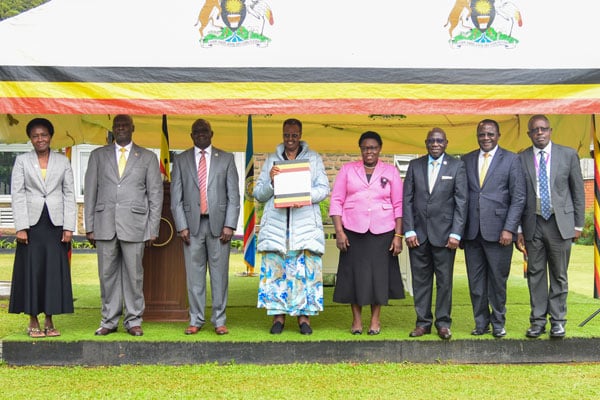Prime
Unprepared teachers, business-minded pupils fueling poor grades in Namutumba - Report

Children playing in the compound of Nalende Primary School in Bulange sub-county, Namutumba District on February 19, 2024. PHOTO/RONALD SEEBE
What you need to know:
- Rather than blame the teachers, Mr Kiire says other factors, including automatic promotion of learners, teachers’ absenteeism and failure by parents to feed their children, affect their learning.
A new report that sought to explain some of the factors fueling poor performance in government-aided Universal Primary Education (UPE) schools in Namutumba District show gaps between teacher-pupil learning structures.
The data collection for the report was carried out nine times over the three terms last academic year by the district inspectors of schools, and two constituency inspectors.
According to the findings, 40 percent of the teachers enter classrooms without a lesson plan, 60 percent do not know how to use the scheme of work, while some teachers lack syllabus books and learning aids.
The findings explain that while teaching without a lesson plan does not only show lack of professionalism, it also shows a lack of preparation.
The report recommends that the teaching profession finds good teachers who not only monitor learners’ presence in classrooms, but also what they teach.
The District Information Officer, Mr Noah Kiire, said it is true that some teachers are conducting classes without a lesson plan which is against the profession.
“We cannot blame the education office for those teaching without a scheme of work and lesson plan, but their deputy head teachers whose work is to approve teachers’ scheme of work and also make sure that they (teachers) have lesson plans before they enter classrooms,” Mr Kiire said on February 19.
But rather than blame the teachers, Mr Kiire says other factors, including automatic promotion of learners, teachers’ absenteeism and failure by parents to feed their children, affect their learning.
He added: “It is unfortunate that even School Management Committees (SMC) and Parents Teachers Associations (PTA) have paid little attention to teachers’ absenteeism yet they are their immediate supervisors.”
According to Mr Kiire, none of the aforementioned committees are reporting teachers’ absenteeism, yet their functions are to oversee school activities and report any matter to the relevant authorities.

A teacher instructs pupils at Nsongwe Primary School in Bugobi town council, Namutumba District on February 19, 2024. PHOTO/RONALD SEEBE
Mr Aggrey Lwanga, the Bulange sub-county Internal Security Officer, said the inspection report has clearly shown why learners in government-aided UPE schools perform poorly every year.
“It is now evident that learners in Namutumba UPE schools are performing poorly because they are being taught by those who teach what they do not know because they do not know how to scheme work,” he said.
He, however, called for refresher courses and teacher training on how to scheme work and prepare lesson plans, which he said will tell whether or not the learners are meeting the goals and objectives set by their teachers.
The District Education Officer (DEO), Dr Muhammad Isiko, said the district has established a monitoring system, in addition to what the government has put in place, which he said will raise red flags when teachers do not turn up in classes.
According to him, starting this academic year, their system of work has changed and will see less time in office, and more time spent on monitoring and supervising schools to know what teachers are teaching in classrooms.
Part-time, business-minded pupils
Schools are struggling to keep part-time, business pupils in class and later recoup good grades from them.
A teacher who requested to remain anonymous for fear of losing her job says they should not always be blamed for the district’s poor performance, especially in UPE schools, but the government and learners, too, must take the blame.
In the 2023 Primary Leaving Examinations (PLE) results which were released on January 25, the district registered 221 first grades (3.9 percent) and 1,554 failures (27.3 percent), which was worse than the previous year (2022) where they got 407 first grades (6.7 percent) and 1,288 (20.4 percent) failures.
“We teach business-minded children who are now “part-timers” in class. They spend half a day at school and later go to trading centres to sell tomatoes, groundnuts and roasted maize,” she said on Monday.
She added: “While UPE schools get all funds from the government, including syllabus books and textbooks, it is only in Namutumba where a UPE school lacks syllabus books, some schools have less than ten books, and some head teachers do not feed teachers.”
Parents, however, say they have “played their part” by providing their children with “all the necessary requirements needed” but teachers are “not doing their work”.
Mr John Waiswa, a retired teacher and resident of Nalende village, said poor teaching starts with poor lesson planning and scheme of work, adding that a lesson plan allows a teacher to review his or her material and adjust it based on the learners’ needs.
“Without a plan in place, a teacher finds it difficult to make changes or adapt to the teaching style to the learners’ needs,” Mr Waiswa said, adding that poor performance in UPE schools is as a result of unnecessary transfer of teachers.
“On several occasions the education office transfers teachers in the middle of the academic year which affects their concentration,” Mr Waiswa said.




